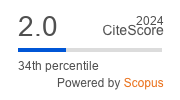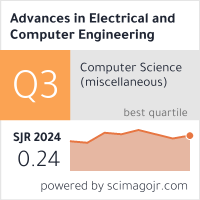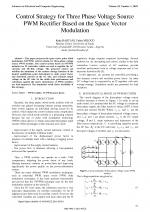| 3/2010 - 10 |
Control Strategy for Three Phase Voltage Source PWM Rectifier Based on the Space Vector ModulationHARTANI, K. |
| Extra paper information in |
| Click to see author's profile in |
| Download PDF |
Author keywords
PWM rectifier, SV-PWM, power factor
References keywords
control(13), phase(8), power(7), electronics(7), voltage(5), rectifier(5), vector(4), space(4)
Blue keywords are present in both the references section and the paper title.
About this article
Date of Publication: 2010-08-31
Volume 10, Issue 3, Year 2010, On page(s): 61 - 65
ISSN: 1582-7445, e-ISSN: 1844-7600
Digital Object Identifier: 10.4316/AECE.2010.03010
Web of Science Accession Number: 000281805600010
SCOPUS ID: 77956640002
Abstract
This paper proposes the space vector pulse width modulation (SVPWM) control scheme for three-phase voltage source PWM rectifier. The control system based on SVPWM includes two PI controllers which are used to regulate the AC currents and DC-link voltage. The proposed control can stabilize the minimum of the systems storage function at the desired equilibrium point determined by unity power factor and sinusoidal current on the AC side, and constant output voltage on the DC side. So the stable state performance and robustness against the load's disturbance of PWM rectifiers are both improved. The simulation result shows feasibility of this strategy. |
| References | | | Cited By «-- Click to see who has cited this paper |
| [1] S. Mazumder, "DSP based implementation of a PWM AC/DC/AC converter using space vector modulation with primary emphasis on the analysis of the pratical problems involved," in 12th Applied Power Electronics Conference, 1997, pp. 306-312. [CrossRef] [SCOPUS Times Cited 2199] [2] S. Hansen, M. Malinowski, F. Blaabjerg, M. P. Kazmierkowski, "Control strategies for PWM rectifier without line voltage sensors," in Proc. IEEE-APEC conf. vol. 2, pp. 832-839, 2000. [3] Li Yabin, Li Heming, P. Yonglong, "A Unity Power Factor Three-Phase Buck Type SVPWM Rectifier Based on Direct Phase Control Scheme, Mobile Robots," Power Electronics and Motion Control Conference, 2006, IPEMC'06, vol. 8, no. 2, pp. 520-531. [CrossRef] [4] C. T. Pan and J. Shieh, "New space vector control strategies for three-phase step-up/down AC/DC converter," IEEE Trans. On Industriel Electronics, vol. 47, pp. 25-35, February 2000. [CrossRef] [SCOPUS Times Cited 33] [5] S. R. Bowes, S. Grewal, "Novel harmonic elimination PWM control strategies for three-phase PWM inverters using space vector techniques," Electric Power Applications, IEE proceeding, vol. 146, pp. 451-495, Sept. 1999. [CrossRef] [SCOPUS Times Cited 33] [6] W. Jiuhe, Y. Hongren, Z. Jinlong and Li Huade, "Study on power decoupling control of three phase voltage source PWM rectifiers," Power Electronics and Motion Control Conference, 2006. [7] W. Xinggui, R. Tinghui and H. Zhongliang, "Sliding mode control of three-phase voltage source PWM rectifier," Power Electronics, vol. 41, no. 1, pp. 31-33, 2007. [8] C. T. Pan, "Modeling and analysis of a three-phase PWM ac-dc converter without current sensor," Pro. Inst. Eng. B. vol. 40, March 1993. [9] Z. Kuiyin, T. Yongqi, S. Xuejun, "Three-phase voltage PWM rectifier based on current variable structure control," Journal of Human Institute of Engineering, vol. 15. no. 3, pp. 1-3, sep. 2005. [10] K. Hartani, M. Bourahla, Y. Miloud, M. Sekour, "Electronic Differential with Direct Torque Fuzzy Control for Vehicle Propulsion System," Turkish Journal of Electrical Engineering & Computer Sciences, vol. 17, no. 1, pp. 21-38 March 2009. [11] Z. Chongwei and Z. Xing, "PWM rectifier and its control," China machine Press. 2003. [12] R. Rocha, P. Resende and J. Silvino, "A robust control design for induction generator system," in Proc. Of IEEE International Symposium on Industrial Electronics, pp. 551-555, 1999. [CrossRef] [13] D. Zhao, R. Ayyanar, "Space vector PWM with DC link voltage control and using sequences with active state division," Industrial Electronics, IEEE Industrial Symposium on vol. 2, pp. 1223-1228, July 2006. [CrossRef] [SCOPUS Times Cited 12] Web of Science® Citations for all references: 0 SCOPUS® Citations for all references: 2,277 TCR Web of Science® Average Citations per reference: 0 SCOPUS® Average Citations per reference: 175 ACR TCR = Total Citations for References / ACR = Average Citations per Reference We introduced in 2010 - for the first time in scientific publishing, the term "References Weight", as a quantitative indication of the quality ... Read more Citations for references updated on 2025-06-30 17:51 in 42 seconds. Note1: Web of Science® is a registered trademark of Clarivate Analytics. Note2: SCOPUS® is a registered trademark of Elsevier B.V. Disclaimer: All queries to the respective databases were made by using the DOI record of every reference (where available). Due to technical problems beyond our control, the information is not always accurate. Please use the CrossRef link to visit the respective publisher site. |
Faculty of Electrical Engineering and Computer Science
Stefan cel Mare University of Suceava, Romania
All rights reserved: Advances in Electrical and Computer Engineering is a registered trademark of the Stefan cel Mare University of Suceava. No part of this publication may be reproduced, stored in a retrieval system, photocopied, recorded or archived, without the written permission from the Editor. When authors submit their papers for publication, they agree that the copyright for their article be transferred to the Faculty of Electrical Engineering and Computer Science, Stefan cel Mare University of Suceava, Romania, if and only if the articles are accepted for publication. The copyright covers the exclusive rights to reproduce and distribute the article, including reprints and translations.
Permission for other use: The copyright owner's consent does not extend to copying for general distribution, for promotion, for creating new works, or for resale. Specific written permission must be obtained from the Editor for such copying. Direct linking to files hosted on this website is strictly prohibited.
Disclaimer: Whilst every effort is made by the publishers and editorial board to see that no inaccurate or misleading data, opinions or statements appear in this journal, they wish to make it clear that all information and opinions formulated in the articles, as well as linguistic accuracy, are the sole responsibility of the author.



